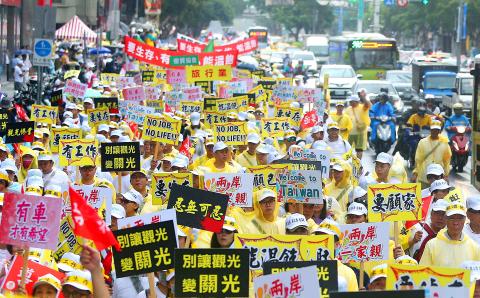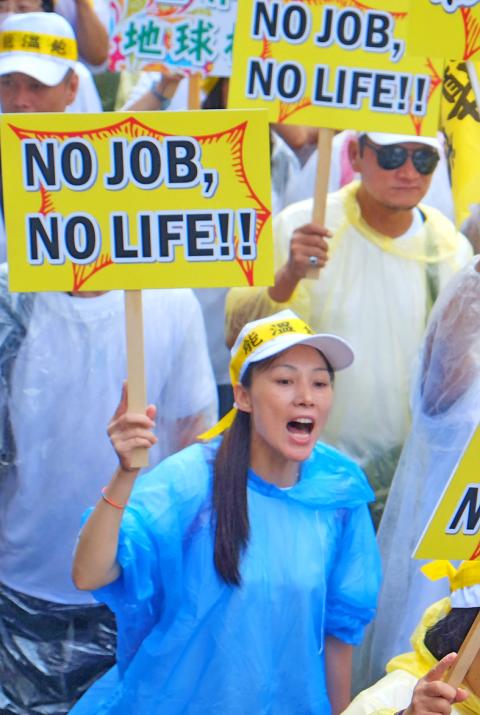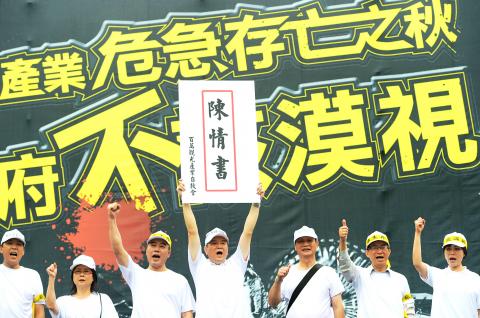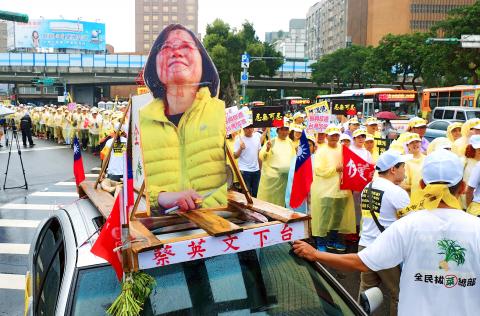About 10,000 people marched through downtown Taipei yesterday afternoon calling on the government to help the tourism industry amid a drop in the number of Chinese tourists.
It was the first-ever protest organized by people and firms in the tourism industry, including travel agencies, tour guides, hoteliers, hostel operators, restaurant owners, tour bus companies and representatives of other businesses.
The march began at the Huashan 1914 Creative Park and headed toward Ketagalan Boulevard by way of Chungshiao E Road, Hanzhou S Road and Renai Road.

Photo: CNA
A travel agency manager from Kaohsiung surnamed Rong (容) said those who took part in yesterday’s protest were “only the tip of an iceberg,” adding that the situation was expected to worsen in the next three months.
“We want to tell the government that its new southbound policy is not going to be an immediate cure to the travel industry’s current plight,” she said.
Tourism operators from southern Taiwan chartered at least 30 buses to bring people to Taipei, Rong said, adding that Chiayi County has been the hardest hit by the drop in Chinese visitor numbers.

Photo: Sam Yeh, AFP
Asked how bad the situation is, Rong said that some guides and bus drivers have been on unpaid furloughs for almost two months because there was no business from Chinese tour groups.
Alishan, a must-see destination for most of the Chinese tourists, now gets fewer than 10 tour buses per day, she said.
Boat owners at Sun Moon Lake (日月潭) are also hurting.

Photo: Chang Chia-ming, Taipei Times
“A tour guide used to be able to handle three tour groups every month, earning a monthly salary of between NT$50,000 and NT$100,000 [US$1,577 and US$3,153], but now they cannot do that anymore and they still have dozens of bills to pay. You can understand their anger and anxiety,” she said.
The NT$30 billion relief fund that the government is planning to spend to help the industry cannot possibly cover all the industry’s losses, she said.
A guide surnamed Lin (林) said that China’s National Day holiday is coming soon, and Japan and South Korea are trying to attract more tourists from China during that period.

Photo: Sam Yeh, AFP
Only Taiwan is trying to push Chinese tourists away, he said, adding: “I really do not know what our government is thinking.”
Lin said he is willing to follow the government’s policy to attract more tourists from Southeast Asia, but it must provide complementary measures to help address the problems businesses are facing.
He said he has a mortgage of about NT$10 million and has not had any income for two months, while his friends who own tour buses are struggling to pay off the loans they took out to buy the vehicles.
A luxury goods store representative from Hualien, who spoke on condition of anonymity, said the NT$30 billion is just a short-term solution.
“We want a fishing rod, not the government just providing us with fish,” she said.
Yesterday’s protest concluded with representatives of the travel industry delivering a petition to the Presidential Office.
The petition said that Taiwan attracted about 2 million Chinese tourists in tour groups last year, and the industry hoped about 1 million Chinese would come on group tours this year, representatives said.
However, that means the government needs to attract about 2 million more travelers from other countries to make up for the shortfall in Chinese tourists because Chinese spend about twice as much time in Taiwan as travelers from other countries, they said.
To make up such a huge shortfall, 12 suggestions were made, ranging from further streamlining visa application procedures for Southeast Asian tourists, allowing Chinese tourists to use their passports for a 72-hour transit in Taiwan before heading to a third country, offering subsidies to international tourists who spend at least two nights in central or southern Taiwan and raising the number of domestic travelers nationwide by giving out vouchers for weekday travel.

‘TAIWAN-FRIENDLY’: The last time the Web site fact sheet removed the lines on the US not supporting Taiwanese independence was during the Biden administration in 2022 The US Department of State has removed a statement on its Web site that it does not support Taiwanese independence, among changes that the Taiwanese government praised yesterday as supporting Taiwan. The Taiwan-US relations fact sheet, produced by the department’s Bureau of East Asian and Pacific Affairs, previously stated that the US opposes “any unilateral changes to the status quo from either side; we do not support Taiwan independence; and we expect cross-strait differences to be resolved by peaceful means.” In the updated version published on Thursday, the line stating that the US does not support Taiwanese independence had been removed. The updated

‘CORRECT IDENTIFICATION’: Beginning in May, Taiwanese married to Japanese can register their home country as Taiwan in their spouse’s family record, ‘Nikkei Asia’ said The government yesterday thanked Japan for revising rules that would allow Taiwanese nationals married to Japanese citizens to list their home country as “Taiwan” in the official family record database. At present, Taiwanese have to select “China.” Minister of Foreign Affairs Lin Chia-lung (林佳龍) said the new rule, set to be implemented in May, would now “correctly” identify Taiwanese in Japan and help protect their rights, the Ministry of Foreign Affairs said in a statement. The statement was released after Nikkei Asia reported the new policy earlier yesterday. The name and nationality of a non-Japanese person marrying a Japanese national is added to the

AT RISK: The council reiterated that people should seriously consider the necessity of visiting China, after Beijing passed 22 guidelines to punish ‘die-hard’ separatists The Mainland Affairs Council (MAC) has since Jan. 1 last year received 65 petitions regarding Taiwanese who were interrogated or detained in China, MAC Minister Chiu Chui-cheng (邱垂正) said yesterday. Fifty-two either went missing or had their personal freedoms restricted, with some put in criminal detention, while 13 were interrogated and temporarily detained, he said in a radio interview. On June 21 last year, China announced 22 guidelines to punish “die-hard Taiwanese independence separatists,” allowing Chinese courts to try people in absentia. The guidelines are uncivilized and inhumane, allowing Beijing to seize assets and issue the death penalty, with no regard for potential

‘UNITED FRONT’ FRONTS: Barring contact with Huaqiao and Jinan universities is needed to stop China targeting Taiwanese students, the education minister said Taiwan has blacklisted two Chinese universities from conducting academic exchange programs in the nation after reports that the institutes are arms of Beijing’s United Front Work Department, Minister of Education Cheng Ying-yao (鄭英耀) said in an exclusive interview with the Chinese-language Liberty Times (the Taipei Times’ sister paper) published yesterday. China’s Huaqiao University in Xiamen and Quanzhou, as well as Jinan University in Guangzhou, which have 600 and 1,500 Taiwanese on their rolls respectively, are under direct control of the Chinese government’s political warfare branch, Cheng said, citing reports by national security officials. A comprehensive ban on Taiwanese institutions collaborating or